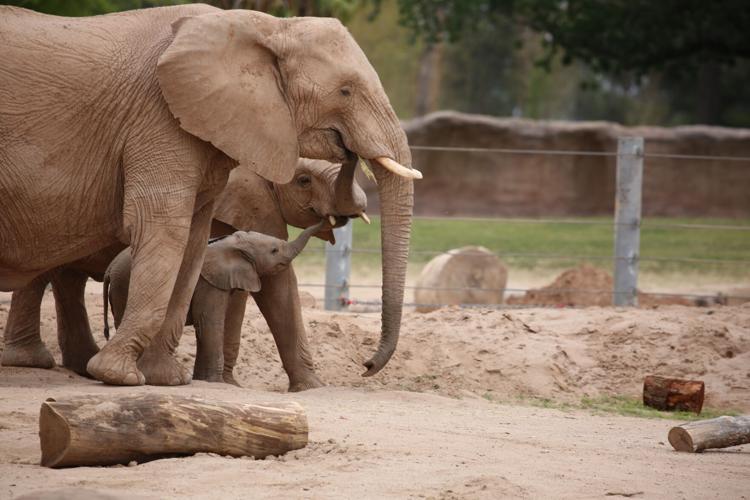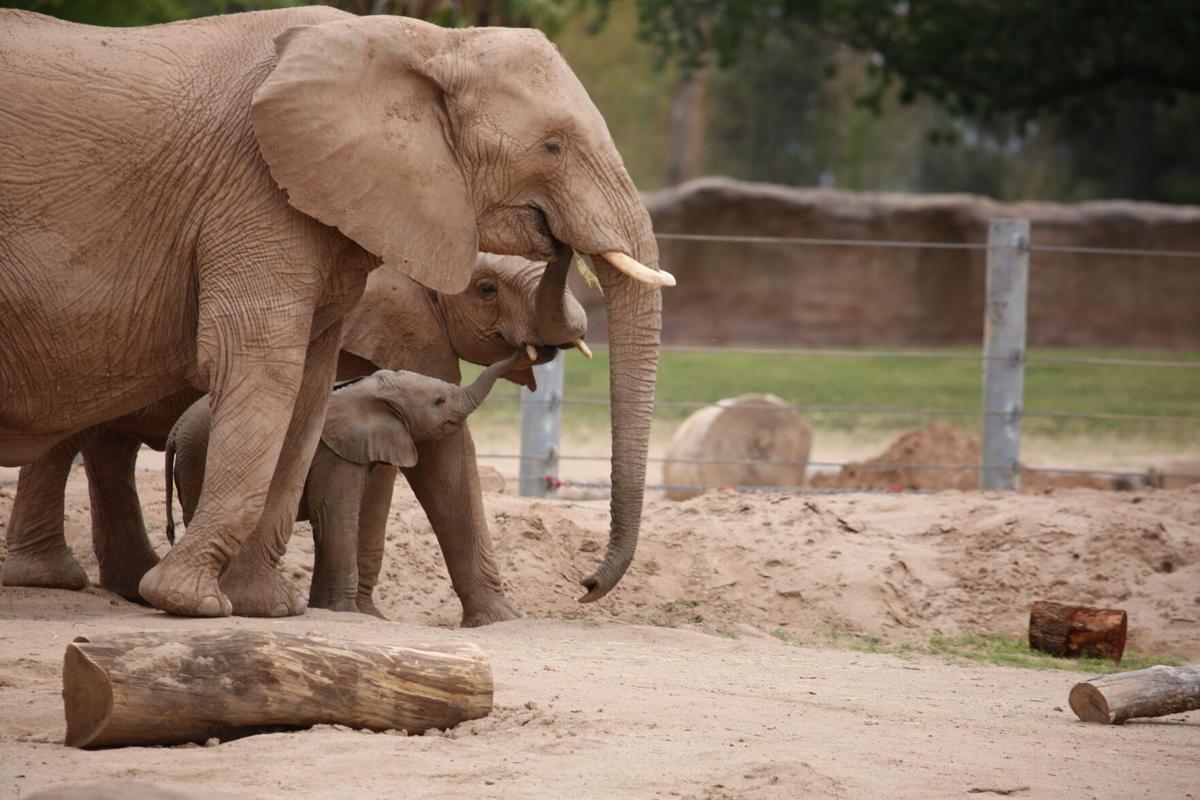Two weeks and 19,000 votes later, Tucson’s biggest baby has a name.
Reid Park Zoo thought up three different options for the 2-month-old African elephant and brought the names to the community: Meru, in honor of Mount Meru in Tanzania; Zalika, which means “well born” in Swahili; and Zuma, in honor of Nigeria’s Zuma rock formation.
Just under 8,000 votes were cast for Meru, pronounced may-ru.
The 411-pound baby was born on March 8 to mama Semba. She joins sisters 9-year-old Nandi and 4-year-old Penzi, along with allomother Lungile.
Although the poll only ended three weeks ago, Meru is already getting familiar with her name.
“She always beats her mom to the trainer,” elephant supervisor Cassie Dodds says. “If we call them, she gets really excited and runs top speed to get there first.”
Training sessions at Reid Park Zoo, 3400 E. Zoo Court, are voluntary for the elephants and done through positive reinforcement. Training allows staff members to evaluate the elephants’ health and well-being.
“She’s had a really big growth within her personality and her curiosity around her environment,” Dodds says. “And also socially, we’re seeing her get really excited about working with her trainers.”
Meru will likely nurse for several more years, and while she sometimes munches on teeny bits of hay, pellets and grass, she’s not very interested in food. But she is interested in scratches.
“She’ll follow a target ball with her head and move her body around to follow the target — and all she wants is some scratches,” Dodds says. “So she’s really figuring out the interactions with us, but she’s also figuring out the interactions with the herd.”

Elephant calf Meru is pictured here with big sister Penzi and mom Semba.
From the beginning, Penzi was never Meru’s biggest fan — but that’s likely because Penzi is still young and doesn’t yet have the instincts to be as nurturing or protective. But Penzi has gotten better — she’s let the baby touch her and stand under her legs. Their relationship is making progress.
Nandi, on the other hand, actually is Meru’s biggest fan.
“She’s really watchful. If she sees Penzi getting frustrated with the calf, she’ll put herself in between them,” Dodds says. “She’s got a really strong role as babysitter that she takes as her top priority right now, so much so that if Nandi is doing a really great job with a training session, we’ll send Nandi over to wherever the calf is.”
Semba is also doing well — getting much-needed rest as the mother of a newborn. Keepers have been able to open up Semba and Meru’s barn area to Nandi and Penzi, allowing for overnight sleepovers that help Semba get additional rest because she doesn’t have to be as alert with Nandi around. (Don’t worry — only a cable sits between them and Lungile, so the loyal auntie isn’t alone and can still interact with the rest of the herd.)
A couple times a day, Meru is also starting to move a tiny bit away from Mom as she spends time with her other herd members.
“Elephants’ most important resource outside of food and water is each other. Right now, what Meru is doing is working on forming bonds and relationships with her herd,” Dodds says. “In the wild, they’ll live in multigenerational herds and if they have family members of older age, those elephants can help them navigate their environment and find resources when things are scarce. Those elephants will know where to take them if there’s a drought or will show them how to navigate. It’s something that’s the most important thing to elephants — to work on social relationships.”
Large herds are often home to areas where elephants are frequently hunted and poached for ivory.
“What we’re trying to do at the zoo is support elephant conservation and encourage people not to buy ivory,” Dodds says.
Reid Park Zoo's elephant calf Meru loves playtime and exploring her habitat, including figuring out how to get over logs. Video courtesy Reid Park Zoo
Part of the zoo’s work in elephant conservation includes enrichment and playtime, which Meru loves.
“She thinks everything is fun right now. She’s enthusiastic and curious about everything,” Dodds says. “One of her most favorite things is water. She’s learned how to drink water so she can put her trunk in the water and drink it. She’ll spend a lot of time getting water into her mouth. If we bring a hose out — that’s one of her favorite things. She’ll spend a lot of time playing with the water, putting water in her face. She also really loves her toys — she’ll play with pretty much any toy.”
The elephant team even fashioned a braided firehose just for her. It’s almost half her size, but when she first got it, she played with it nonstop until she fell asleep — right on top of it.
“Last month, her big challenge was climbing over logs and how to get over them. It’s definitely a very physical experience, trying to master their bodies to build strength and confidence,” Dodds says. “She’s definitely a physical youngster. All of (the calves) have had different personalities and she’s very interested in using her body to experiment with her environment.”
As you can imagine, keepers spend a lot of time with the elephants. But they also make sure to visit with zoo guests to answer questions and share tidbits about the herd.
“A lot of schools are bringing their field trips by and you can just collectively — the moment they see her — see their expressions and their excitement,” Dodds says. “It’s exciting for us to hear that. It’s almost like we’re seeing her for the first time again.”






